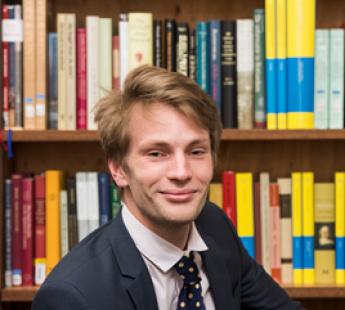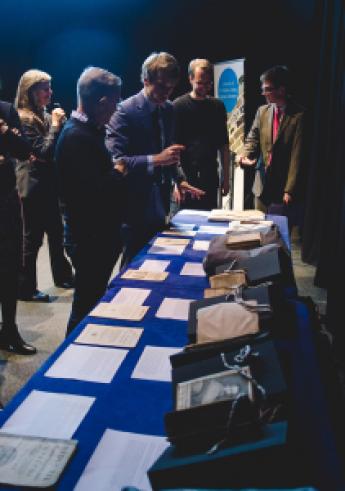Winner of the James D. Forbes Collecting Prize 2017 - University of St Andrews (UK)

Arthur der Weduwen :
My book collection attempts to offer a representative sample of the cheap and ephemeral “daily literature” of the Dutch Golden Age (c. 1588-1713). This includes official print (ordinances, edicts, proclamations), pamphlets, newspapers, devotional literature, and any other cheap literature in small formats (popular histories, poetry, pocketbook classics or dictionaries). My collection is currently made up of 34 items, most of which would have sold in the 17th century for less than a few stuivers – the equivalent of a couple of pints of beer – or given away for free.The subject of my collection was inspired by my scholarly interests as a PhD student here at St Andrews. My research focuses on the influence of books, news and print on Dutch society at the height of its prosperity in the seventeenth century. Dutch publishers from this period are well known for their exquisite scholarly publications and dominance of the international book trade, but it was the domestic Dutch book market, especially the production of cheap vernacular literature, which underpinned the liquidity of the book trade. Most Dutch citizens would encounter the literate world not through atlases or philosophical treatises, but through school books, political pamphlets, or broadsheets issued by local authorities, pasted up around town. It is this more fugitive world of print which I seek to document through my collection.
 I started collecting three years ago. I first bought a couple of books from antiquarian booksellers online, but my collection expanded quickly once I developed the habit of visiting book markets in various Dutch cities, where you can often find tables displaying dozens of pamphlets, all thrown together in a large heap. I find this one of the most enjoyable aspects of collecting: the anticipation of finding something unique, or previously unknown, and the excitement of being able to purchase an item which I have used in my own research before.
I started collecting three years ago. I first bought a couple of books from antiquarian booksellers online, but my collection expanded quickly once I developed the habit of visiting book markets in various Dutch cities, where you can often find tables displaying dozens of pamphlets, all thrown together in a large heap. I find this one of the most enjoyable aspects of collecting: the anticipation of finding something unique, or previously unknown, and the excitement of being able to purchase an item which I have used in my own research before.
It was a great honour to be the recipient of the James D. Forbes collecting prize this year, and I would once again like to thank the judges for this privilege. I also want to thank the University of St Andrews Library, with whom it has been a pleasure to pick out a book for their Special Collections as part of my prize. I found a remarkable item on a weekly online rare book auction, which I was lucky enough to be able to buy for the Library. This is a bound volume of four Dutch political tracts written by Bernard Alting (c.1600-c.1655), a statesman from Groningen, in the north of the Netherlands. Alting played a major part in the political controversies of the province of Groningen in the 1630s and 1640s, and wrote two of the four works included in this volume in defence of the rights of the city of Groningen against the nobles and landowners of the rural countryside. The third text is a treatise on the office of municipal secretary or pensionary, which Alting held for many years; and the final text is a literary discussion of the evils of political intrigue (described in Dutch as “political coopering” – the title page of the pamphlet features a woodcut illustration of a cooper at work). The four tracts were first printed in the 17th century, but were re-issued in 1710 by Johannes van Velsen, a Groningen printer. It is possible that Van Velsen marketed the four tracts as a set: most other surviving copies of the four tracts have been preserved in similar bound volumes.

I was able to use my own prize money to acquire three new items for my collection. These includes a Greek-Latin lexicon for use by Dutch university students (published in Leiden in 1644), a pocketbook classic edition of Suetonius’s Twelve Caesars (printed by the famous cartographer-publisher Willem Jansz Blaeu in Amsterdam in 1630) and a French tragedy by Pierre Corneille printed in Amsterdam in 1689. Building my collection in this manner, one book or a few pamphlets at a time, is an immense pleasure: as an academic endeavour, as a means to satisfy my curiosities, and to preserve a piece of history.
Arthur der Weduwen
PhD Candidate in the School of History
